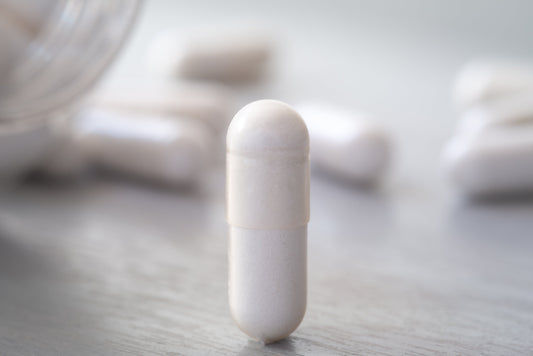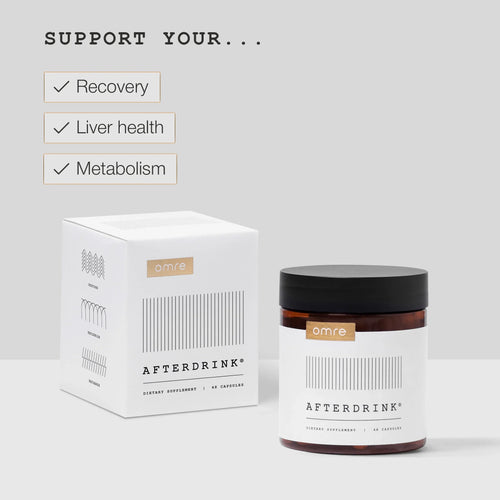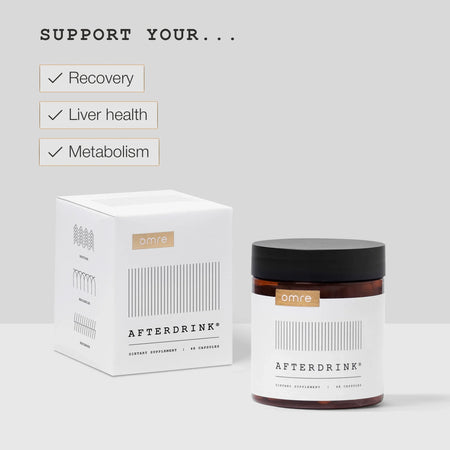Table of Contents
Is magnesium good for hangovers? It's a common question with a not-so-strong-forward answer.
People have been looking for a natural hangover remedy since the discovery of alcohol. However, there are so many health fads that it's hard to separate the facts from the myths.
Magnesium is one of the most abundant minerals in the body and is essential for life. It's involved in the normal functioning of your metabolism, nervous system, and muscles, to name a few.
In this article, we examine the relationship between magnesium and alcohol to answer the question: Is magnesium good for hangovers?
Afterdrink®
A supercharged antioxidant designed to support recovery, made from the very best, research-backed ingredients on the market.*
DOES DRINKING ALCOHOL AFFECT MAGNESIUM LEVELS?
Studies have shown that "acute heavy" drinking and "chronic" alcohol use can lead to urinary magnesium loss. (1)(2)
There are a couple of ways this is thought to happen:
DIURESIS
Firstly, alcohol is a diuretic, which means it increases the amount of urine you produce. It does this by blocking the release of vasopressin from your pituitary gland, which controls water regulation by your kidneys.
Essential electrolytes such as magnesium, sodium, and potassium are also lost with water. (3)
INCREASED MAGNESIUM USE
When alcohol is metabolized (broken down) in your liver, toxic by-products such as Acetaldehyde are formed. These react with your cells, causing inflammation, and is one of many ways drinking too much alcohol is thought to cause hangovers.
During this inflammatory process, metabolically active immune cells use magnesium. Secondly, magnesium is used up during the metabolism of alcohol and during the inflammatory process that occurs after heavy alcohol consumption. (4) (5)
Magnesium depletion due to alcohol can lead to symptoms such as muscle cramps and headaches, which can further contribute to your hangover discomfort. However, replenishing magnesium through supplements or electrolyte drinks can help alleviate these symptoms.
With all that said, it's important to emphasize that the studies mentioned above are mostly reporting magnesium loss in acute heavy (i.e., binge drinking) or chronic (i.e., long-term damaging use of alcohol). Alcohol consumption within recommended limits is unlikely to have such an impact.
CAUSES OF A HANGOVER
Before we get into whether magnesium works as a hangover remedy, we first need to go over how alcohol affects your body:
DEHYDRATION
We mentioned above that alcohol is a diuretic. In fact, for every glass of wine you drink, you lose approximately 120ml more water. If you've had a few glasses of wine, this quickly adds up, causing dehydration. Dehydration is one of the leading causes of a hangover. It is responsible for symptoms including dry mouth, feeling light-headed, and lacking energy.
In addition to dehydration, alcohol disrupts the sodium-potassium balance in your body, which is why rehydrating with electrolyte-rich drinks, mainly those containing magnesium, sodium, and potassium, is crucial if you want to reduce your hangover symptoms.
INFLAMMATION
One of the main toxic by-products of alcohol metabolism is Acetaldehyde. This volatile molecule breaks down into charged particles (free radicals) that react with the cells it contacts, causing cellular inflammation.
Your body utilizes an array of antioxidants to neutralize free radicals before they cause damage. However, during periods of overindulgence, this system is quickly exhausted.
Alcohol also impairs glutathione production, a potent antioxidant essential for detoxifying the liver. Boosting glutathione levels through diet or supplements can help mitigate the severity of hangovers and protect the liver from long-term damage.
SLEEP DISTURBANCE
Alcohol also significantly disrupts your sleep quality and is an often overlooked cause of a hangover. Alcohol blocks your brain from reaching the REM stage of sleep. Without getting to this stage, your mind won't be fully rested.
IS MAGNESIUM GOOD FOR HANGOVERS?
It’s unclear if magnesium is good for hangovers. While alcohol consumption can deplete magnesium levels, replenishing magnesium alone is unlikely to significantly alleviate hangover symptoms due to their complex and multifactorial causes.
Hangovers are caused by various factors, including dehydration, inflammation, and nutrient imbalances.
Magnesium depletion may play a minor role, especially with excessive alcohol consumption, but it hasn’t been explicitly studied in relation to hangovers.
Magnesium, along with other nutrients like zinc, vitamins B1, B3, B6, and C, is essential for supporting alcohol metabolism and protecting the liver.
However, addressing hangovers requires a combination of hydration, balanced nutrition, and rest. While magnesium may help as part of a broader recovery approach, it’s not a standalone solution for hangover relief.
IS IT OK TO TAKE MAGNESIUM AFTER DRINKING ALCOHOL?
Yes, it is generally safe to take magnesium after drinking alcohol. It can help replenish magnesium levels depleted by alcohol consumption, but it’s unlikely to significantly impact hangover symptoms on its own.
IS MAGNESIUM A HANGOVER CURE?
No, magnesium is not a hangover cure. While it may help replenish depleted levels caused by alcohol consumption, it does not address the primary causes of hangovers, such as dehydration, inflammation, or poor sleep.
Afterdrink®
A supercharged antioxidant designed to support recovery, made from the very best, research-backed ingredients on the market.*
MAGNESIUM ABSORPTION
If you're considering taking magnesium supplements for hangovers, it's essential to realize that they are not all the same.
Magnesium supplements could be absorbed better by your gut. People often choose a supplement with the highest magnesium content because they believe it will deliver the highest amount.
However, the type of magnesium is much more critical as the way the supplement dissolves in your gut determines how much is absorbed.
For example, studies have shown that magnesium citrate is better absorbed than magnesium oxide. (6)
The food you eat also impacts magnesium absorption. High protein and fatty foods tend to increase the absorption of magnesium. (7)
SIDE EFFECTS
Knowing some side effects of taking magnesium is essential. However, magnesium is very well tolerated; most people will have no side effects.
One of the most common side effects of taking magnesium is diarrhea and abdominal discomfort. These are also common hangover symptoms, so they are something to be aware of.
ANYTHING ELSE TO CONSIDER?
Hangovers are a sign from your body that you've had too much alcohol for your liver to handle. Trying to "cure" a hangover with magnesium or any other supplement is not the best approach.
It's also essential to avoid certain medications like acetaminophen while you're recovering from a hangover, as it can cause liver damage if you combine it with alcohol. Use NSAIDs like ibuprofen cautiously, with plenty of water, since you would otherwise risk kidney damage in a dehydrated state.
The best way to cure a hangover is to prevent it from happening in the first place. Drinking less at a slower pace, eating before going out, and ensuring you drink plenty of water are all required to prevent the worst hangovers.
Sticking to lighter-colored drinks may also help. This is because darker drinks like red wine and whiskey contain a much higher concentration of congeners. These are by-products produced during the aging process of alcohol, which studies have shown to make hangovers much more severe. You can read more about this in our article about congeners.
MAGNESIUM FOR HANGOVERS – FINAL VERDICT
That brings us to the end of our look into whether taking magnesium for hangovers has any benefit.
Magnesium levels are known to drop in heavy and chronic alcohol use. However, it's unlikely that moderate drinking will significantly impact magnesium levels.
It is currently unknown whether magnesium reduces hangover symptoms. However, it could support your body's antioxidant defenses.
Additionally, maintaining gut health by including prebiotics and other gut-health-focused nutrients can improve overall recovery from a hangover.
If you're interested in other natural hangover remedies, check out our article on the best vitamins.





